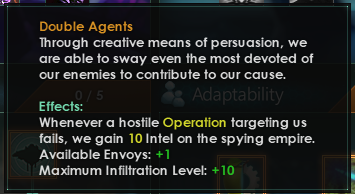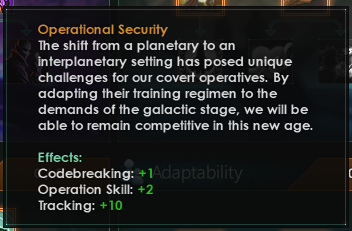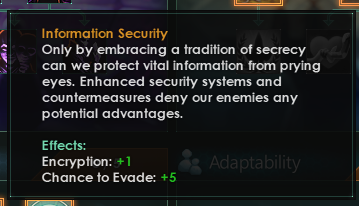Hi everyone!
The Stellaris 3.3.1 “Libra” Custodian Update has been released, and once again it’s time to look back on the past and forward to the future.
The 3.3 update went through an Open Beta which we feel was a stunning success. With the aid of the community, the systems were significantly improved and a large number of bugs were found and squashed. Thank you again for your help!
A 3.3.3 update is expected to follow in a few weeks to address additional issues.
One of the changes we’re planning for the May update is inspired by some of the feedback we received during the Unity Open Beta. We’re switching the initial costs for Espionage Operations to Influence rather than a massive pile of Energy Credits. Operation Upkeep will remain in Energy Credits. Exact values are subject to change.
While making that change we also added a few improvements to the Subterfuge Tradition Tree.
A focus on Espionage can put some strain on your Envoy supply, so the Double Agents tradition will now provide one, in addition to increasing your Maximum Infiltration Level by 10.

The known and the nameless, familiar and faceless.
Meanwhile, earlier in the tree we’ve decided to add some combat benefits to the tree to represent their enhanced ECM and ECCM capabilities. Empires focusing in Subterfuge now have an easier time locking on to enemy ships, as well as foiling the attempts of others to do the same to them.

Computer's locked. Getting a signal.

Go dead. Shut everything down and make like a hole in the void.
As with the earlier changes, these numbers are also still subject to change and a deeper review of Espionage Operations is still planned in the future.
Currently, Gaia Seeders can only be built on planets that match your planetary preference, which led to a play cycle where they had to terraform a planet before being able to utilize their special buildings.
Instead, we’re going to expand the valid planets of the Gaia Seeders as you gain terraforming technologies.

Much easier.

Okay, it’ll be much easier once we actually know how to do it.
Gaia Seeders can be freely built on planets that match your homeworld type as before, but can also be built on other planets of the same general climate type (Dry, Wet, or Cold) once you have Terrestrial Sculpting.
Since the Maweer Caretakers come from a Tropical World (Wet), they need the Ecological Adaptation technology to upgrade the Gaia Seeders on this Alpine World (Cold).
Tomb Worlds can also be seeded once the Climate Restoration technology has been acquired.
The upkeep of the Gaia Seeders building is increased using the same tiers of terraforming difficulty as the building placement.
Crisis Expansion Team has been working on, they’re not quite ready to share that information quite yet. Soon™.
One of our agents did manage to sneak some of the wonderful work of the Concept Art Team out though...

It’s a thing, with greebles! And it’s game-changing.
The Stellaris 3.3.1 “Libra” Custodian Update has been released, and once again it’s time to look back on the past and forward to the future.
The 3.3 update went through an Open Beta which we feel was a stunning success. With the aid of the community, the systems were significantly improved and a large number of bugs were found and squashed. Thank you again for your help!
The 3.3 Cycle
A 3.3.2 release went up today to fix a few things that got found at the last minute, including localization issues in French, Portuguese, and Russian, as well as a potential crash some people have encountered.- Fixed localization issues affecting articles in French, Russian, and Brazilian Portuguese
- Fixes a crash that would occur when attempting to apply a species template to a species with a different amount of traits than what is in the template.
- Fixed species template application trait add/remove checks being inverted.
A 3.3.3 update is expected to follow in a few weeks to address additional issues.
New Players and the Tutorial
Stellaris isn’t always the easiest game to get into. Don’t be alarmed if there are changes to the tutorial and early game experience. We’re going to be gathering data about different elements of the new player experience, trying out various things and seeing what works.Onwards to 3.4
Meanwhile, 3.4 is just around the corner. Currently planned for May, the Custodian side of the 3.4 update will continue to refine the balance around Unity and address some more of the feedback from the Open Beta and 3.3 release, as well as being the target for the planned release of the Situations system first described in Dev Diary 234. We’ll give Situations and our planned uses for them a complete Dev Diary in the near future.Influence and Espionage
With 3.3, Influence is the primary resource for external diplomacy, fast travel, and expanding living space.One of the changes we’re planning for the May update is inspired by some of the feedback we received during the Unity Open Beta. We’re switching the initial costs for Espionage Operations to Influence rather than a massive pile of Energy Credits. Operation Upkeep will remain in Energy Credits. Exact values are subject to change.
While making that change we also added a few improvements to the Subterfuge Tradition Tree.
A focus on Espionage can put some strain on your Envoy supply, so the Double Agents tradition will now provide one, in addition to increasing your Maximum Infiltration Level by 10.

The known and the nameless, familiar and faceless.
Meanwhile, earlier in the tree we’ve decided to add some combat benefits to the tree to represent their enhanced ECM and ECCM capabilities. Empires focusing in Subterfuge now have an easier time locking on to enemy ships, as well as foiling the attempts of others to do the same to them.

Computer's locked. Getting a signal.

Go dead. Shut everything down and make like a hole in the void.
As with the earlier changes, these numbers are also still subject to change and a deeper review of Espionage Operations is still planned in the future.
Idyllic Bloom Improvements
A quality of life change being made to the Idyllic Bloom civic is also planned for 3.4 (coming in May).Currently, Gaia Seeders can only be built on planets that match your planetary preference, which led to a play cycle where they had to terraform a planet before being able to utilize their special buildings.
Instead, we’re going to expand the valid planets of the Gaia Seeders as you gain terraforming technologies.

Much easier.

Okay, it’ll be much easier once we actually know how to do it.
Gaia Seeders can be freely built on planets that match your homeworld type as before, but can also be built on other planets of the same general climate type (Dry, Wet, or Cold) once you have Terrestrial Sculpting.
Since the Maweer Caretakers come from a Tropical World (Wet), they need the Ecological Adaptation technology to upgrade the Gaia Seeders on this Alpine World (Cold).
Tomb Worlds can also be seeded once the Climate Restoration technology has been acquired.
The upkeep of the Gaia Seeders building is increased using the same tiers of terraforming difficulty as the building placement.
What Else is Coming?
Regarding what theOne of our agents did manage to sneak some of the wonderful work of the Concept Art Team out though...

It’s a thing, with greebles! And it’s game-changing.



